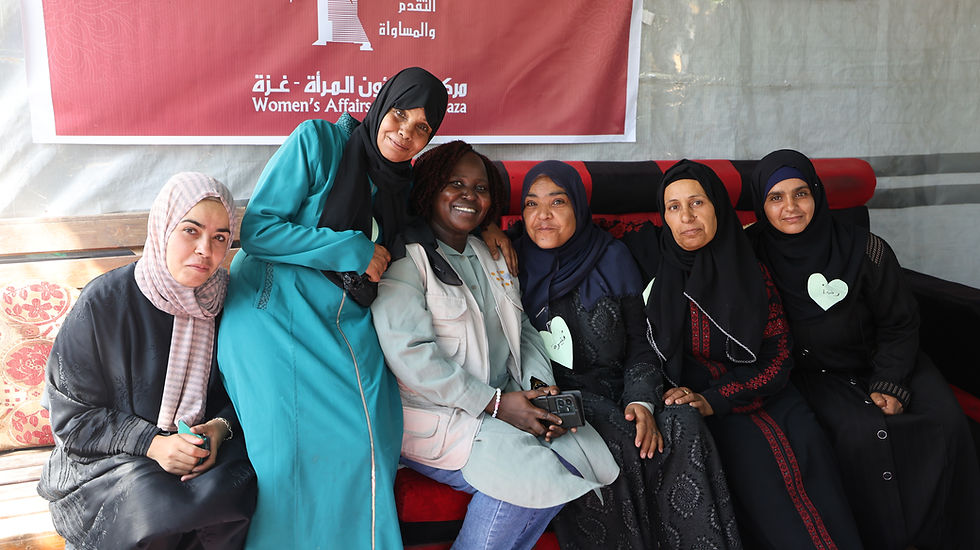Tasiana Mzozo, Climate Services Adviser from NORCAP to WFP
- Standby Partnership Network

- Jul 24, 2023
- 3 min read
Updated: Oct 14, 2024
Climate crisis is one of the main drivers of hunger today. Consequently, WFP is helping food insecure communities to prepare for, respond to, and recover from climate shocks and stresses. WFP saves lives following climate-related disasters. WFP also implements climate risk management solutions in 42 countries, benefiting more than 15 million people.
Tasiana Mzozo is a Kenyan Climate Services Adviser seconded by NORCAP to WFP Headquarters since 2021. She supports the Climate and Disaster Division’s efforts to expand its fairly new climate services programme, thus furthering the corporate objective of addressing the challenges of climate change and food insecurity.

Growing up in Kenya's semi-arid Taita-Taveta County, Tasiana witnessed firsthand the struggles her family and community faced due to climate change. The rainy seasons consistently failed, leading to disastrous harvests and increasing food insecurity. In this challenging context, Tasiana saw how her relatives relied primarily on local knowledge to predict weather conditions and adapt their farming practices. “For instance, if rain started from a certain side of the mountain we could tell if it would be raining a lot or not. Flowering of mango trees and high or low fruit yields would indicate whether the season would perform well or not,” she recalls.
But Tasiana knew that traditional knowledge alone was not sufficient to cope with rapid climate change and extreme weather events. She saw how advances in meteorology and information transmitted through radios and mobile phones helped improve weather forecasts and provided more accurate information to farmers. Driven by a desire to contribute to the solution, Tasiana pursued studies in community development and public health, specializing in disaster risk management and climate services.
Joining WFP in 2021 as a Standby Partner with more than 10 years’ experience, Tasiana used her expertise to improve the provision of climate information to vulnerable communities. During her mission, she worked closely with WFP's regional offices to provide technical guidance to country offices implementing climate services projects. She also contributed to the development of forecasting and early warning strategies for countries affected by floods and droughts. Overall, Tasiana played a crucial role in delivering climate services and establishing relationships with local providers. She integrated climate services into country-based climate-risk management programmes, monitoring their impact, and aligning them with disaster risk reduction initiatives.

As Tasiana's deployment nears its end, she humbly recognizes the impact of her contributions. Her work ensured the long-term sustainability of climate services programming and the expansion of WFP's global climate services programme. “Climate services is a fairly new area for WFP”, she admits. “Since I joined the team, I have mapped and consolidated climate services programming in 21 countries, enabling 6.5 million additional people to access climate information through radio, mobile phones or face to face communication. Progress is ongoing”.
Tasiana also mentored women in climate services activities, enhancing gender representation and increasing technical human resources within WFP's offices. “WFP is participating in NORCAP’s Female Accelerator Programme to increase the number of women in humanitarian climate services. I am currently mentoring a female Climate Scientist who is ready to join the field after gaining technical experience in Headquarters and making connections with regional and country offices.“
Head of Unit Jesse Masson confirms her numerous achievements: "Tasiana's expertise in climate services has been instrumental in improving the lives of vulnerable populations. Her personal connection to climate change drives her commitment, making her an exceptional advocate for climate justice”.

Beyond her work, Tasiana always keeps her own community and the challenges they face in mind. She hopes that the knowledge gained through her experience in climate services will eventually be passed on to the community to help them cope with current and future climate challenges. She is determined to continue fighting for climate justice and strengthening the resilience of vulnerable communities. Ultimately, Tasiana recognizes that her childhood in a climate-affected region was not a burden but a motivation to make a difference and improve the lives of others.
Since 1991 the World Food Programme (WFP) collaborates with a vast network of Standby Partners consisting of public and private organizations complementing WFP’s operational capacity by providing staffing, equipment, and services. Standby Partnerships are activated in various job positions and provide crucial support to WFP operations in emergencies or when WFP needs specific technical expertise. In 2022, 205 experts supported 45 Country Offices, 4 Regional Bureaux, and Headquarters. To request and deploy experts Standby Partners please reach out to WFP Standby Partnerships team in the Emergency Operations Division at: standbypartners@wfp.org.




Comments